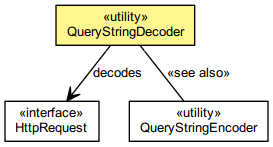
- java.lang.Object
-
- org.jboss.netty.handler.codec.http.QueryStringDecoder
-
public class QueryStringDecoder extends Object
Splits an HTTP query string into a path string and key-value parameter pairs. This decoder is for one time use only. Create a new instance for each URI:
This decoder can also decode the content of an HTTP POST request whose content type is application/x-www-form-urlencoded:QueryStringDecoderdecoder = newQueryStringDecoder("/hello?recipient=world&x=1;y=2"); assert decoder.getPath().equals("/hello"); assert decoder.getParameters().get("recipient").get(0).equals("world"); assert decoder.getParameters().get("x").get(0).equals("1"); assert decoder.getParameters().get("y").get(0).equals("2");QueryStringDecoderdecoder = newQueryStringDecoder("recipient=world&x=1;y=2", false); ...HashDOS vulnerability fix
As a workaround to the HashDOS vulnerability, the decoder limits the maximum number of decoded key-value parameter pairs, up to 1024 by default, and you can configure it when you construct the decoder by passing an additional integer parameter.- See Also:
QueryStringEncoder
-
-
Constructor Summary
Constructors Constructor and Description QueryStringDecoder(String uri)Creates a new decoder that decodes the specified URI.QueryStringDecoder(String uri, boolean hasPath)Creates a new decoder that decodes the specified URI encoded in the specified charset.QueryStringDecoder(String uri, Charset charset)Creates a new decoder that decodes the specified URI encoded in the specified charset.QueryStringDecoder(String uri, Charset charset, boolean hasPath)Creates a new decoder that decodes the specified URI encoded in the specified charset.QueryStringDecoder(String uri, Charset charset, boolean hasPath, int maxParams)Creates a new decoder that decodes the specified URI encoded in the specified charset.QueryStringDecoder(String uri, String charset)Deprecated.UseQueryStringDecoder(String, Charset)instead.QueryStringDecoder(URI uri)Creates a new decoder that decodes the specified URI.QueryStringDecoder(URI uri, Charset charset)Creates a new decoder that decodes the specified URI encoded in the specified charset.QueryStringDecoder(URI uri, Charset charset, int maxParams)Creates a new decoder that decodes the specified URI encoded in the specified charset.QueryStringDecoder(URI uri, String charset)Deprecated.UseQueryStringDecoder(URI, Charset)instead.
-
Method Summary
Methods Modifier and Type Method and Description static StringdecodeComponent(String s)Decodes a bit of an URL encoded by a browser.static StringdecodeComponent(String s, Charset charset)Decodes a bit of an URL encoded by a browser.Map<String,List<String>>getParameters()Returns the decoded key-value parameter pairs of the URI.StringgetPath()Returns the decoded path string of the URI.
-
-
-
Constructor Detail
-
QueryStringDecoder
public QueryStringDecoder(String uri)
Creates a new decoder that decodes the specified URI. The decoder will assume that the query string is encoded in UTF-8.
-
QueryStringDecoder
public QueryStringDecoder(String uri, boolean hasPath)
Creates a new decoder that decodes the specified URI encoded in the specified charset.
-
QueryStringDecoder
public QueryStringDecoder(String uri, Charset charset)
Creates a new decoder that decodes the specified URI encoded in the specified charset.
-
QueryStringDecoder
public QueryStringDecoder(String uri, Charset charset, boolean hasPath)
Creates a new decoder that decodes the specified URI encoded in the specified charset.
-
QueryStringDecoder
public QueryStringDecoder(String uri, Charset charset, boolean hasPath, int maxParams)
Creates a new decoder that decodes the specified URI encoded in the specified charset.
-
QueryStringDecoder
@Deprecated public QueryStringDecoder(String uri, String charset)
Deprecated. UseQueryStringDecoder(String, Charset)instead.
-
QueryStringDecoder
public QueryStringDecoder(URI uri)
Creates a new decoder that decodes the specified URI. The decoder will assume that the query string is encoded in UTF-8.
-
QueryStringDecoder
public QueryStringDecoder(URI uri, Charset charset)
Creates a new decoder that decodes the specified URI encoded in the specified charset.
-
QueryStringDecoder
public QueryStringDecoder(URI uri, Charset charset, int maxParams)
Creates a new decoder that decodes the specified URI encoded in the specified charset.
-
QueryStringDecoder
@Deprecated public QueryStringDecoder(URI uri, String charset)
Deprecated. UseQueryStringDecoder(URI, Charset)instead.
-
-
Method Detail
-
getPath
public String getPath()
Returns the decoded path string of the URI.
-
getParameters
public Map<String,List<String>> getParameters()
Returns the decoded key-value parameter pairs of the URI.
-
decodeComponent
public static String decodeComponent(String s)
Decodes a bit of an URL encoded by a browser.This is equivalent to calling
decodeComponent(String, Charset)with the UTF-8 charset (recommended to comply with RFC 3986, Section 2).- Parameters:
s- The string to decode (can be empty).- Returns:
- The decoded string, or
sif there's nothing to decode. If the string to decode isnull, returns an empty string. - Throws:
IllegalArgumentException- if the string contains a malformed escape sequence.
-
decodeComponent
public static String decodeComponent(String s, Charset charset)
Decodes a bit of an URL encoded by a browser.The string is expected to be encoded as per RFC 3986, Section 2. This is the encoding used by JavaScript functions
encodeURIandencodeURIComponent, but notescape. For example in this encoding, é (in UnicodeU+00E9or in UTF-80xC3 0xA9) is encoded as%C3%A9or%c3%a9.This is essentially equivalent to calling
URLDecoder.decode(s, charset.name())- Parameters:
s- The string to decode (can be empty).charset- The charset to use to decode the string (should really beCharsetUtil.UTF_8.- Returns:
- The decoded string, or
sif there's nothing to decode. If the string to decode isnull, returns an empty string. - Throws:
IllegalArgumentException- if the string contains a malformed escape sequence.
-
-